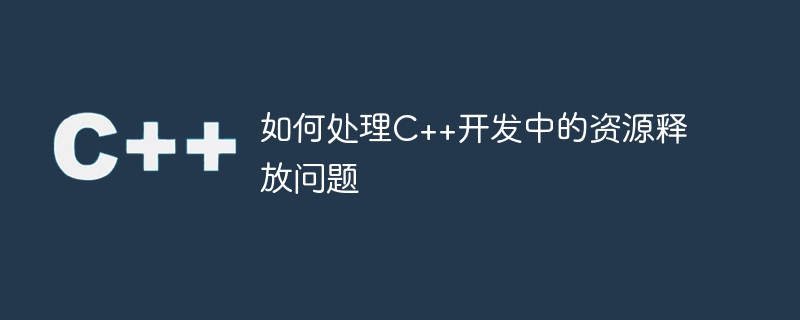

How to deal with resource release issues in C development
In C development, the correct release of resources is a crucial issue. If resources are released incorrectly, problems such as memory leaks, unclosed files, database connection leaks, etc. may occur, resulting in program performance degradation or even crash. Therefore, during the development process, we must correctly handle the release of resources. This article will introduce some common resource release problems and provide corresponding solutions.
1. Memory Management
Memory leak is a very common problem. When we use the new operator to dynamically allocate memory, we need to use the delete operator to release the memory. However, if you forget to call the delete operator after using the memory, a memory leak will occur. To avoid this, we can use smart pointers to manage memory. Smart pointers automatically release memory when the object is no longer used. In addition, you can also use RAII (Resource Acquisition Is Initialization) technology to apply for resources in the object's constructor and release the resources in the destructor to ensure that resources can be released correctly under any circumstances.
2. File Operation
In C, after the file opening operation is completed, the fclose function must be called to close the file. If you forget to close a file, you may leak file handles and exhaust the system's number of file handles. In order to avoid this problem, you can use RAII technology to create an object that encapsulates the file handle, and close the file by calling the fclose function in the object's destructor.
In addition, you can also use the fstream class in the C standard library to perform file operations. The fstream class automatically closes the file when the object is destroyed. Using the fstream class makes it easy to read and write files and avoids the problem of manually handling file handles.
3. Database connection management
During database operations, if the database connection is not closed correctly, the database connection may be leaked. In order to avoid this problem, you can use RAII technology to create an object that encapsulates the database connection, and call the closing function of the database connection in the object's destructor.
In addition, some database connection pool implementations can also effectively manage database connections. The connection pool will create a certain number of database connections in advance, obtain the connections from the connection pool when needed, and return the connections to the connection pool after use, avoiding the overhead of frequently creating and closing database connections and improving program performance. .
4. Exception handling for resource release
When releasing resources, you also need to pay attention to exception handling. If an exception occurs during the process of releasing resources, some resources may not be released correctly. To avoid this situation, exception-safe resource management can be used.
A common exception-safe resource management method is to place the resource release operation at the end of the try block and use RAII technology to encapsulate the resource class. In this way, even if an exception occurs, resources can be released correctly.
In addition, you can also use the exception handling mechanism in the C standard library, use try-catch statements to catch exceptions, and release resources in the catch block.
When releasing resources, we need to do the following:
In short, in C development, the correct release of resources is a very important issue. Through reasonable resource management methods and complete exception handling mechanisms, we can effectively avoid problems such as resource leaks and improve program stability and performance.
The above is the detailed content of How to deal with resource release issues in C++ development. For more information, please follow other related articles on the PHP Chinese website!




